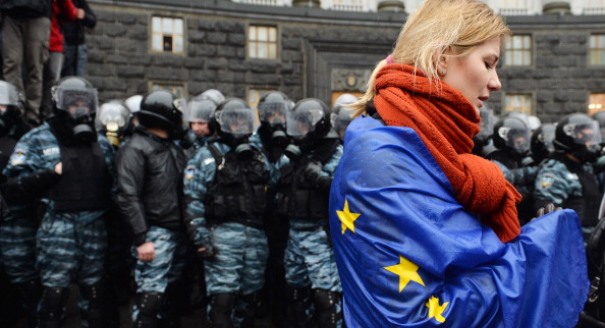As tensions spiral in Ukraine, the EU needs to revisit its approach to its troubled Eastern neighbor.
After Ukrainian President Viktor Yanukovych snubbed EU leaders by not signing a painstakingly negotiated association agreement at last week’s Eastern Partnership summit in Vilnius, the union’s response was relatively sanguine. The EU told Ukraine that its “door was still open” if and when Kiev reconsidered its decision. Within the EU, most debate was in fact about Russia, rather than Ukraine itself. Some governments felt the union had stood admirably firm on its democratic principles and not descended to the level of Russian blandishments.
Events on the ground in Ukraine now risk rendering the EU’s approach obsolete. As Yanukovych has brutally deployed riot police against protesters, a far firmer diplomatic response has begun to take shape. The EU is good at holding out the incentive of formal trade and cooperation agreements that can influence governments already minded to democratic reform. But it should be abundantly clear by now that this is an insufficient strategy for dealing with the power-preservation tactics of the current Ukrainian administration.
The EU will need to embrace greater diplomatic intervention if it is serious about protecting those Ukrainians now demonstrating for a European future. Simply reiterating that the door to association is open now looks incongruous. Yanukovych should be made to realize that he risks losing even the current cooperation that the EU provides if he uses violence against protesters.
Yanukovych insists he wishes to sign the association agreement at an EU-Ukraine summit scheduled for March 2014, if he can negotiate certain increases in economic cooperation from the EU. While positive engagement should remain the cornerstone of EU diplomacy, the situation in Ukraine has become sufficiently serious for the union not to be bounced into signing the agreement.
It is understandable that many policymakers will feel anxious to “regain” Ukraine, after so much comment about the EU having “lost” the country to Russia. But the fast-evolving political context makes this Europe-versus-Russia dichotomy the wrong the prism through which to see the Ukrainian dilemma.
In such a highly charged and turbulent environment, it requires some extreme optimism to think that the technical focus of the association agreement can suffice. A policy aimed more directly at undercutting the Ukrainian government’s autocratic “power vertical” is needed.
If and when negotiations resume, they should be far more participatory. By involving civil society groups and a range of political organizations, the EU will reduce the risk of a future agreement once again being held hostage to the power calculations of one leader. Involving a broader array of actors will also help build the coalitions necessary for successful implementation of the agreement—normally the thornier challenge than its mere signing.
While thousands now fill Kiev’s squares to militate for Ukraine’s European future, surveys have revealed a low level of awareness of what an association agreement actually entails. The EU must improve its public diplomacy and be more proactive in broadening the reform constituency.
It will be difficult for Ukrainian citizens to maintain the momentum of civic pressure until the next presidential election, due in 2015. It is unclear whether they can succeed in bringing forward this vote. European support can help build civil society capacities and opposition unity. The European Commission and EU member states should step up their so far rather limited support for civil society activities. This should include initiatives that can expose the manipulation of electoral processes in the run-up to the 2015 poll. Stronger help for independent media is also a priority as the president’s cronies stifle coverage of the protests.
But it will also be important for the EU to keep in mind the lessons from the immediate aftermath of the 2004–2005 Orange Revolution. Simply getting pro-European politicians into office will guarantee little. Yanukovych’s defeat must not lead to a repeat of the rivalry between different opposition leaders that derailed the Orange Revolution after 2005. Ukraine needs a radically different form of politics, not simply a change of leader.
In recent years, EU leaders’ willingness to show more generous solidarity with Ukrainian citizens has not been tested. The EU has been able to deflect the question of Ukraine’s membership prospects by pointing to the country’s authoritarian drift: accession just did not seem immediately pertinent anymore.
Now, this is no longer the case. In the last few days, most EU leaders have declared that they will stand by Ukrainians demonstrating with such passion for a European future. The country’s fractious opposition parties have promised to work together, and they state that the European vocation is the main aspiration that can unite them. If this and the scale of last week’s protests fail to jolt EU governments into putting accession on the table, then EU leaders will justifiably be charged with hypocrisy.
A promise of membership would not be a panacea; it may not have been enough to sway Yanukovych through the course of 2013. But it is one factor that would embolden democrats. And in the months to come, they will need all the extra help they can get.


-1.png)

-1.png)

-2.png)